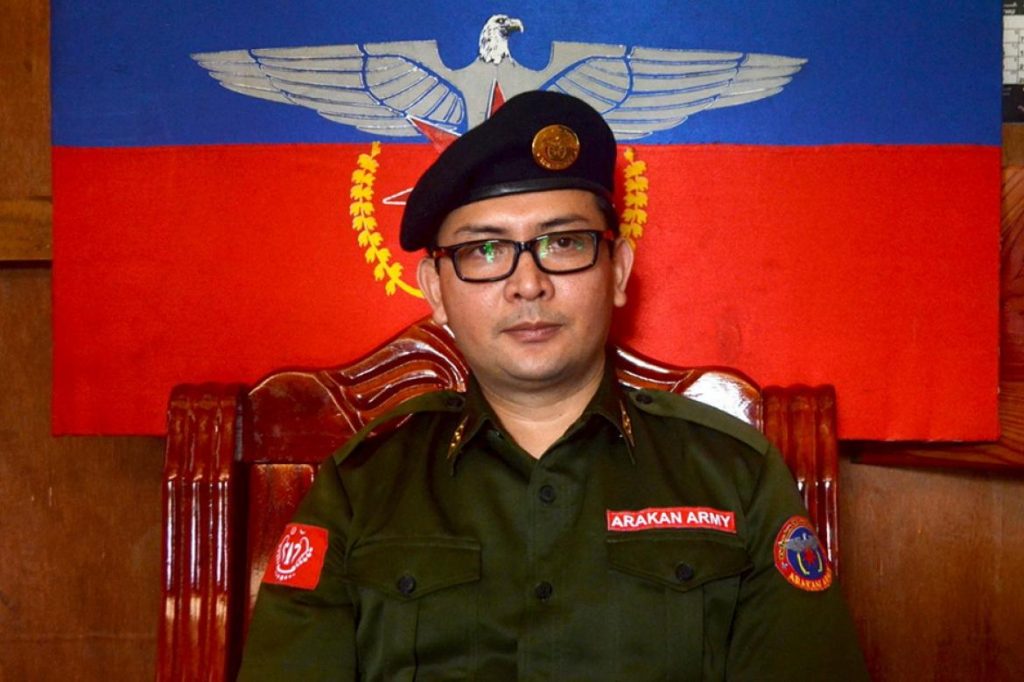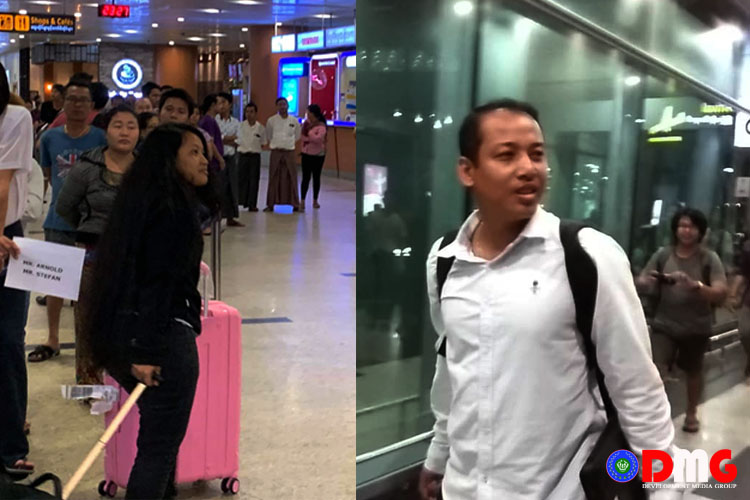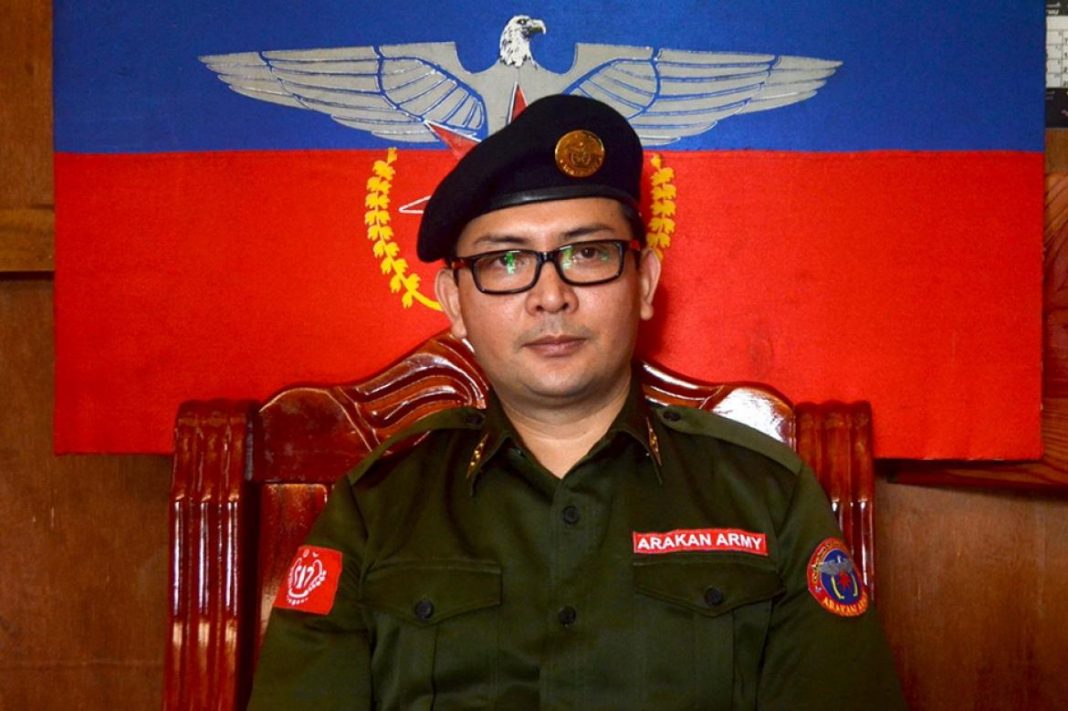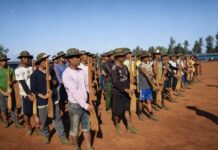When a few weeks ago, in the early hours of June 22, the Arakan Army (AA) struck Myanmar Army or Tatmadaw’s tugboat with Chinese made 107mm surface-to-surface rockets at least three times, killing three and damaging the rear of the boat, in Sittwe, six kilometers away from the Arakan state capital, observers were worried that this would escalate and upgrade into an urban guerrilla warfare, further pushing the country deeper into an open-ended civil war.

Earlier, in February last year Sittwe was target of the three improvised explosive devices (IED) blasts. Although no one was hurt as it seemed the AA just wanted to demonstrate its capability to operate wherever it chooses to do so.
But now we are confronted with another problem of political kidnapping which is relatively new in Myanmar’s conflict arena, save for an incidence a few decades back in Shan state, when in 1973 the late drug warlords Khun Sa’s Shan United Army (SUA) abducted two Russian doctors from a hospital in Taunggyi to bargain for the his release from Mynamar government custody. He was released n 1974 due to the secret brokering of Thai General Kriangsak Chomanan, who eventually became prime minister in August 1977.
Political kidnapping
Generally speaking, it may be said that there are three major categories of this type of activity, personal kidnapping, organized criminal kidnapping and organized political kidnapping, according to Dr Mustafa Alani in his “Political Kidnapping – An Operational Methodology”, published by Gulf Research Center, United Arab Emirate, in 2004.
Dr Mustafa Alani took up the position of senior advisor and director of the Security and Terrorism Studies program at the Gulf Research Center (GRC) on August 20, 2004. Prior to his appointment at the GRC, he worked as senior consultant on Security and Fellow at the Royal United Service Institute for Defense and Security Studies (RUSI) Whitehall – London. He has published on various topics related to security and strategic issues.
He wrote, groups may resort to kidnapping of persons because it fulfills a terrorist organization’s broad strategic objectives as well as being a tactically advantageous method. These ideas can be summarized as winning “free publicity”, obtaining money, exchanging the kidnapped person(s) with detained prisoners, and scoring political gain.
“In political kidnappings, a person or people are abducted by a group for the purpose of changing a government’s behavior — or at least getting that government’s attention. Kidnapping or hostage-taking, especially of high-value targets, is a tactic preferred by political groups because it allows the group to gain media attention and compels a government to enter into dialogue,” wrote Stratfor in an article “Political and War-Zone Kidnappings: The Message — or Money — is the Motive” in 2006.
Arrest of expatriate Arakanese
Taking into account of Dr Alani and Stratfor theoretical explanation, one wonders who is making use political kidnapping to benefit their political agenda in Burma or Myanmar political arena.
Regarding the recent arrest of the seven expatriate Arakanese, which also included AA leader Tun Myat Naing’s brother Aung Myat Kyaw, with the help of Singapore police authorities, the perpetrator could be roundly taken as being the Myanmar government and the Tatmadaw, which is making use of political kidnapping mechanism.

Moreover, United Arakan League (ULA), political arm of the AA, accused Singapore for being in collaboration with the Myanmar government in its statement of July 11. It wrote:
“The unfounded accusation that the Arakanese Association (Singapore) is collecting a ‘National Fund’ for the Arakan Army is much the same as the Government of Singapore is collaborating with the Government of Myanmar to crush a social organization and our revolutionary organization is branded as a terrorist group is inequitable. Therefore, such taking security action of the Government of Singapore and Ministry of Home Affairs against Arakanese people working in Singapore is detrimental to IDPs in Arakan and supporting the Myanmar Army that has committed war crimes.”

AA not yielding
With the AA not yielding to the Tatmadaw’s demands of withdrawing its troops back to Kachin state of Laiza, where its organization has been originated and established ten years ago, and pressuring its leadership to come to negotiation venue for bilateral ceasefire talks within the government’s jurisdiction, the government might consider holding high-value hostage like AA leader’s brother as bargaining chip might alter the situation beneficial to its position.
The bilateral ceasefire proposal initiated by the Northern Alliance – Burma (NA-B) made up of AA, Kachin Independence Army (KIA), Myanmar National Democratic Army (MNDAA) and Ta’ang National Liberation Army (TNLA) was reluctantly accepted by the Tatmadaw, which initially was agreed by the government’s National Reconciliation and Peace Center (NRPC). According to it, NRPC draw back from its initial demand that the NA-B signed the Nationwide Ceasefire Agreement (NCA) and enter the peace negotiation process. But NA-B made a counter proposal to first sign the bilateral ceasefire, amend the NCA satisfactorily and signed it at a later date, which was accepted by the government.
As of now, after three times of draft exchange between the NA-B and the NRPC, negotiation to sign the bilateral ceasefire deal still could not be conducted, due to the disagreement on the choice of meeting venue.

The AA is distrustful of the Tatmadaw and so do the rest of the NA-B members and rightly so, as quite recently, on July 4, authorities charged AA commander-in-chief major general Tun Myat Naing, deputy commander Nyo Htun Aung, brigadier general Kyaw Han, and spokesman Khine Thukha for violating the law, and declared them fugitives, according to Aye Nu Sein, an attorney based at the Rakhine state High Court in Sittwe.
Reportedly they are accused of involvement in a deadly January 4 assault on police outposts and subsequent roadside bomb attacks, and of inciting 13 villagers from Mrauk-U township to assist the AA in its clashes with Myanmar troops.
“They have been saying that they want us in the peace negotiation process, and they had invited us publicly,” AA spokesman Khine Thukha told RFA’s Myanmar Service. “On the other hand, they issued arrest warrants for us while they are asking us to join the negotiations. I view this action as an intent to break up the peace negotiation processes.”
“By charging us for a crime and issuing arrest warrants for our leaders, they are telling us we will not be allowed to travel to their territories,” he said. “In fact, the Myanmar military has been planning this since last March. That’s the reason we cannot join the peace talks, although we have been invited,” reported the RFA.
AA also has its fair share of kidnapping, although it has not demand anything publicly for its abduction of civilians working on road construction in early April of this year.
Eight workers of Su Htoo San Co, which is building a section of the Paletwa-Mizoram road in Paletwa township, are being held for investigation by the AA, which it said that some of them are former military intelligence officers and some still on active duty.
To date, no news of the abductees’ release have been heard, although AA said it will release them if the armed conflict situation calms down as it doesn’t want to be responsible of causality which could arise if they are released during the unsafe situation.
Causalities
While it is hard to correctly pinpoint the casualty figures coming out of the armed engagements between the AA and Tatmadaw, the intensity of the situation could well be imagined. AA estimated over 1,100 fatalities of the Tatmadaw in some 500 contacts might be an inflated figures, but according to one foreign intelligence official monitoring the conflict, 400 deaths of the Tatmadaw and 100 AA losses would be a good estimation, wrote Anthony Davis in Asia Times recently.
According to International Displacement Monitoring Center (IDCM), since December 2018, more than 50 civilians have been killed, with over 100 injured and more than 40,000 displaced amid fighting between the AA and government forces in Arakan state.
Outlook and perspectives
While it is too early to speculate on how this political kidnapping carried out in the name of fighting terrorism from the point of hybrid civilian-military regime, which is tainted with various human rights violations, including extra-judicial killings with regards to the Arakan conflict, nobody should also rule out this facet of conflict escalation.
AA spokesman Khine Thuka recently told the media regarding arrest of the seven Arakanese expatriate that it is also capable of targeting the relatives of Myanmar government and military officials too, but knows not to follow the way of its enemies, because that would only make matters worse.
On July 6, the Myanmar military detained a relative of AA spokesman Khine Thukha together with another two in Ann township. It was later found out that they are being charged under the 2014 Counter-Terrorism Law.
The Tatmadaw might be under the impression that it has the whole Arakanese population as hostages and now having an upper hand as AA’s top leaders kinship are under their custody. If this is the case, the situation could become very sensitive as nobody can also predict on how the AA will react to the situation.
But if we look at the statements of AA and ULA dated July 11, we could presume that the AA leadership is handling it carefully with kit gloves.
In the ULA statement second last paragraph it wrote: “We continue to fight for our people, calling for confederate Arakan state. We call for an immediate release of Arakanese detainees and those arrested and deported from Singapore this week. And we call for a reasonable location for ongoing negotiation with Myanmar state.”
Until now the urban guerrilla warfare and its branching out of political kidnapping haven’t happened like in Latin America’s Columbia a decade ago. It will be wise for the powers that be in Naypyitaw not to wake up the sleeping tiger or stoke the fire by raising the stake higher. And the best to do in this situation is to release the Arakanese detainees and agree upon a neutral meeting venue outside government’s jurisdiction, where the AA and its comrade-in-arms are comfortable with, as a first step gesture of reconciliation.












Leave a Comments